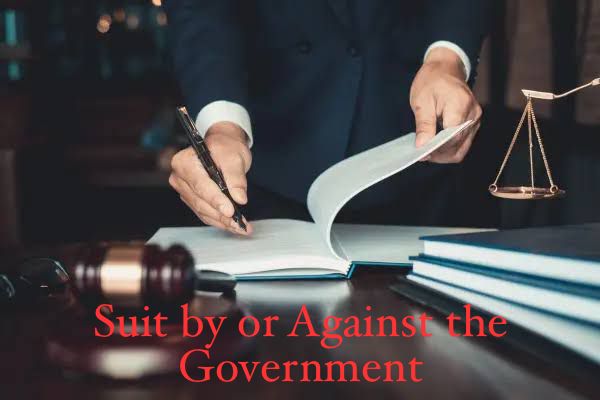 Suits by or Against the Government and Public Officers under CPC (Sections 79–82 & Order 27)
Suits by or Against the Government and Public Officers under CPC (Sections 79–82 & Order 27)
In this Article:
Learn about suits by or against the Government and public officers under CPC (Sections 79–82 read with Order 27). Explained with rules of notice under Section 80 CPC, essentials, exceptions, case laws, and judicial interpretation.
Introduction
The Code of Civil Procedure, 1908 (CPC) provides special provisions for suits involving the Government and public officers under Sections 79 to 82 read with Order 27. These rules ensure that the Government, being a large legal entity, gets proper representation and protection while also balancing the rights of individuals who seek justice against it.
Parties to Suits (Section 79 & Order 27 Rule 3)
In every suit by or against the Government:
• Union of India → in cases involving the Central Government.
• State → in cases involving the State Government.
👉 There is no need to mention detailed names or addresses of government departments in the plaint.
Public Officer Suits (Order 27 Rule 5A):
When a public officer is sued in his official capacity, the Government must also be made a party to the suit.
Rule of Notice – Section 80 CPC
One of the most significant provisions is Section 80 CPC, which mandates a two-month prior written notice before filing a suit against the Government or a public officer for acts done in official capacity.
Object of Notice
The main purpose is:
1. To allow the Government or officer to examine the claim.
2. To settle disputes outside court and avoid unnecessary litigation.
Case Law:
• Amar Nath v. Union of India, AIR 1960 SC 424 – Notice allows the Government to consider settlement.
• Bihari Chaudhary v. State of Bihar, (1984) 2 SCC 627 – A suit filed before expiry of notice period is not maintainable.
Essentials of a Valid Notice [Section 80(1)]
A valid notice must include:
• Name, description, and address of the claimant.
• Clear statement of cause of action.
• Relief(s) claimed.
Exception to Notice Requirement [Section 80(2)]
Notice is not mandatory when:
• The suit is filed for urgent or immediate relief against the Government or a public officer.
• Court’s permission (leave) is obtained before institution.
However:
• No ex parte relief can be granted without hearing the Government.
• If urgency is not proved, the court may return the plaint for compliance with Section 80(1).
Effect of Errors in Notice [Section 80(3)]
A suit cannot be dismissed merely because of minor errors or defects in the notice, if:
• The notice has been duly served, and
• It substantially contains the plaintiff’s identity, cause of action, and relief claimed.
Case Law: Y. Savarimuthu v. State of Tamil Nadu (2019) – Substantial compliance is sufficient.
Does “Government” Include Semi-Government Organizations?
A key question often arises: Does Section 80 CPC apply to statutory corporations or government companies?
Judicial Interpretation
• Kamta Prasad Singh v. Regional Manager, FCI, AIR 1974 Pat 376 – FCI is not “Government” under Section 80 CPC.
• Kerala SEB v. Kurien, AIR 1989 Ker 86 – Statutory corporations may be “State” under Article 12, but not “Government” under CPC.
• Hindustan Petroleum Corp. Ltd. v. A.K. Annadurai (1994) – Government-owned companies are not covered under Section 80.
Conclusion:
The term “Government” in Section 80 CPC strictly refers to:
• The Union of India, or
• A State Government.
It does not extend to statutory corporations, government companies, or semi-government organizations.
Conclusion
The provisions under Sections 79–82 and Order 27 CPC ensure a structured framework for handling suits involving the Government and public officers. While Section 80 CPC notice is mandatory in most cases, exceptions exist for urgent matters. Judicial interpretation has clarified that statutory corporations and semi-government bodies, though considered “State” under Article 12 of the Constitution, are not “Government” under CPC.
Thus, Section 80 balances the interests of individuals seeking justice and the Government’s need for administrative efficiency.
To start your preparation for Judicial Services Examination at home, drop a message on WhatsApp +91 8840961324 or call us on +91 9151591324
At Theory of Abrogation, we equip you with everything you need:
•Subject-wise expert classes
•Mock test series
•Legal current affairs
•Personalized mentorship for interview preparation
“Your law degree is your foundation, but your preparation is what will build your success.”
Join Our New Batch Now!
Prepare smart. Prepare with Theory of Abrogation.
Contact Us:
B-109, Commercial
Complex Dr. Mukherjee
Nagar, Delhi-09
+91 9971399324 | +91 8840961324
[email protected]
